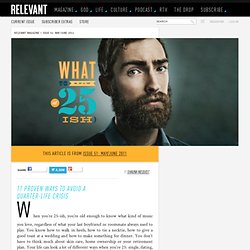

11 Things to Know at 25(ish) When you’re 25-ish, you’re old enough to know what kind of music you love, regardless of what your last boyfriend or roommate always used to play.

You know how to walk in heels, how to tie a necktie, how to give a good toast at a wedding and how to make something for dinner. You don’t have to think much about skin care, home ownership or your retirement plan. Your life can look a lot of different ways when you’re 25: single, dating, engaged, married. 10,000 Women. The 11 Best Steve Jobs Quotes: Remembering The Apple CEO. Conan O'Brien's Guide To Creativity. When we visited his office on the Warner Bros. lot for this year's 100 Most Creative People in Business package, Conan O'Brien opened up about how he works.

He's an analytical guy. He thinks a lot about the creative process, how to turn a half-baked idea from a morning brainstorm into comedy gold (or a diamond--see below) by the 4:30 p.m. taping of his TBS late-night show. In addition to our story, a running account of O'Brien putting together a show last month, here he is talking at more length. For all the preparation he does, the best material often comes from going off-script and reacting in the moment. Which is like surfing. For audio from our Conan interview, click here. Creating a show is like playing the horses. Creativity needs two ingredients, in comedy especially. No, wait--it's really like making of a jewel. It's almost like when you make a diamond. Prepare like crazy so you can wing it. My formula has always been I'm big on preparing.
Business schools and globalisation: Promising the world. Who's Been Trafficking in Your Data? - Robert Plant. By Robert Plant | 10:33 AM November 1, 2011 In the movie Enemy of the State, John Voight, playing an NSA official who suspects Will Smith’s character of wrongdoing, says: “Let’s get into his life.”

Through satellite technologies, communications monitoring, and active tracking devices, he proceeds to do just that. Even if you haven’t angered the NSA lately, rest assured: Someone at this very moment is getting into your life too. Not some security official in the U.S. government, but someone in a publicly traded company whose activities are equally opaque to you. Our love of smart phones, mobile devices, and apps puts high-value data about us into the hands of legions of consumer marketers, and they’re making the most of the opportunity. Consumers generally don’t understand the risks of having their personal data floating around out there. Consumers should be asking some serious questions: “Why am I being tracked?” Blog Archive INFOGRAPHIC: Women and Mentoring in the U.S. « This is a guest post on best practices around social networking from Nicole Williams.

For similar posts check out our series on networking tips and tricks here. – Ed. It may not surprise you, but LinkedIn’s latest study found (in a survey of nearly 1,000 female professionals in the U.S.) that 82 percent of women agree that having a mentor is important. But what will knock your socks off is that considering the competitive employment landscape, and the universal belief that mentorship is a critical component to career success, 19 percent (that’s nearly one out of every five women) have NEVER had a mentor.
Whether you are one of those people who have yet to take advantage of this career-advancing relationship or if you want to add another to your repertoire (yes, you can have more than one) here’s what you need to know. A Reason, a Season or a Lifetime: Start with the goal in mind. Try doing an Advanced People Search on LinkedIn and look for a mentor by narrowing your search parameters. Lunch with the FT: Mickey Drexler. The head of J.

Crew, the preppy clothing brand worn by Michelle Obama, compares fashion to ice-cream and cookies over pizza with Vanessa Friedman My lunch with Millard S. Drexler, the 67-year-old chief executive of J. Crew, the American clothing brand made world famous by its First Client Michelle Obama, turns out not to be a lunch. Or to be more specific: not just a lunch. It begins as just a lunch (a nice, two-hour one at Pulino’s pizzeria in New York) but later Drexler, known as Mickey, emails to say he realises he hasn’t answered one of my questions, has given it some thought and would be happy to discuss it if I want to have a phone chat.
Get the Mentoring Equation Right - Whitney Johnson. By Whitney Johnson | 5:01 PM October 25, 2011 This post was co-authored with Bob Moesta.

While it’s written from my perspective, he was central to the development of the idea.